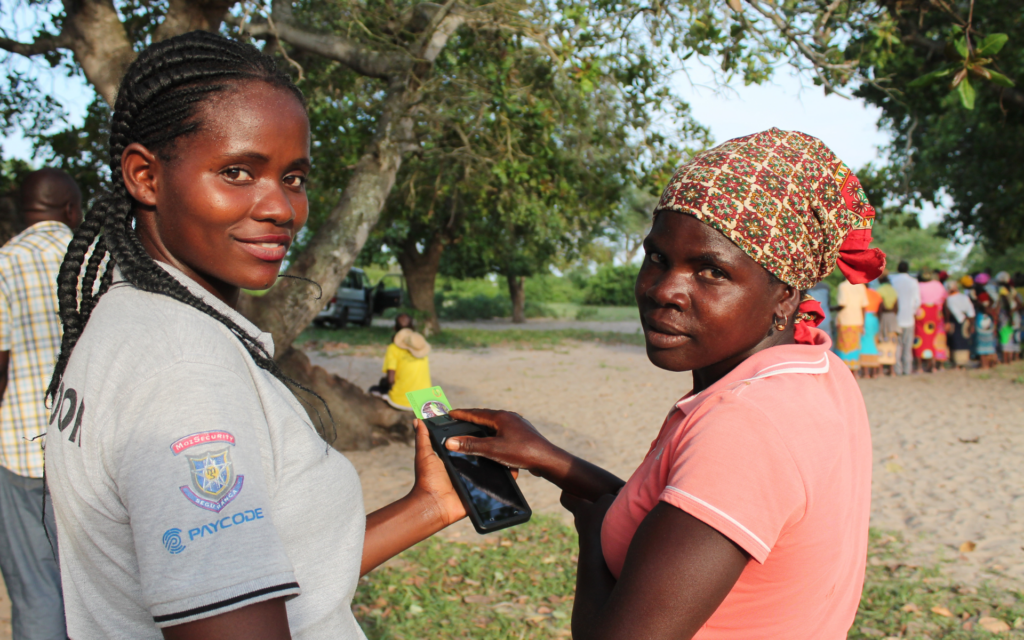To celebrate Women’s World Banking’s 45th anniversary, we are showcasing the voices of individuals from around the world who have shaped and touched Women’s World Banking journey since its inception in 1979 to today!
These are stories from across Women’s World Banking’s reach from the women we serve and our customers, to allies and women in leadership who have contributed to women’s economic empowerment and financial inclusion.
For Gabe Ruhan, technology has always been more than just innovation—it’s about solving real-world problems. From his early days in cloud computing and subsea infrastructure to his current role at the helm of Paycode, Gabe has consistently leveraged technology to break barriers. One day, he was sparked by a realization: “If we can use technology to connect the world digitally, why can’t we do the same for financial empowerment?” Now, his focus is on one of the most persistent challenges in global development: financial inclusion.
More than A Business Opportunity – A Mission Rooted in Experience
The story of Paycode is one of necessity and vision. Its founder, Ralph Pecker, grew up in rural Zambia, where financial exclusion was not an abstract concept but a daily reality. With no access to formal banking services, his parents—like millions of others—were locked out of opportunities that financial access provides.
As Pecker built a successful career in banking software, he was struck by a harsh truth: the systems designed to enable financial inclusion were, in fact, failing those who needed them the most. Determined to change this, he set out to develop a solution that could bridge the gap for those without formal ID, bank accounts, or internet access. That’s where Gabe came in. With his extensive background in technology and infrastructure, he immediately recognized the potential of Paycode’s approach and joined the mission to make finance work for everyone.
It All Starts with an ID
Most of us take financial access for granted—opening an app to send money, pay a bill, or receive government payments with a few taps. But for 850 million people worldwide who lack official identification, these everyday transactions remain out of reach. Women are particularly affected, as nearly half of them in low-income countries do not have any form of ID, compared to just 28% of men. Without ID, they are locked out of the formal economy, unable to open a bank account, receive wages securely, or access credit.
Paycode’s groundbreaking biometric identity and digital payments system eliminates these barriers:
- Lack of Identification – Paycode’s biometric system allows users to register and authenticate themselves using only their fingerprint or facial recognition, removing the ID hurdle.
- Affordability – Traditional banking services come with high costs. Paycode offers a low-cost, offline solution that makes financial services accessible to underserved populations.
- Limited Connectivity – Many rural communities lack internet or mobile coverage, making digital transactions difficult. Paycode operates completely offline, ensuring financial access regardless of location.
For women, these innovations are particularly transformative. Direct digital payments—whether for social grants, wages, or subsidies—allow them to receive funds directly into their own accounts, removing intermediaries and empowering them with financial control.

Ensuring Women are Included in the Future of Finance
Even as Paycode expands financial access, Gabe recognizes that inclusion isn’t just about reaching more people—it’s about ensuring that financial systems work for women. Financial solutions need to be designed with women’s needs in mind, from ensuring clear product information in local languages to providing digital financial literacy support. As research shows, women respond best to “learning-by-doing” tutorials and financial products that communicate benefits in a simple, transparent way.
Paycode is also looking toward the future. Gabe sees an opportunity to leverage biometric transaction data to create alternative credit scores, enabling unbanked individuals—especially women—to access microloans and business financing. However, he is also mindful of the risks that come with emerging financial technologies like blockchain, AI, and digital currencies. If not designed inclusively, these innovations could reinforce existing inequalities rather than eliminate them.
To prevent this, Paycode advocates for decentralized identity models, ensuring that women have control over their own data, and for strong data protection laws that prevent misuse and include opt-in privacy protections for at-risk users.
Joining Other Innovators in Women’s World Banking’s Global Network
As a member of Women’s World Banking’s Global Network, Gabe has found a community of like-minded leaders dedicated to financial inclusion. His experience winning the top prize at the Fintech Innovation Challenge at the Making Finance Work for Women Summit 2023 in Mumbai solidified his belief that solving financial exclusion requires collective action.
“The best financial inclusion solutions aren’t built in boardrooms,” Gabe says. “They are co-created with the people they are meant to serve.”
Women’s World Banking is dedicated to economic empowerment through financial inclusion for the nearly one billion women in the world with no or limited access to formal financial services. Using our sophisticated market and consumer research, we turn insights into real action to design and advocate for policy engagement, digital financial solutions, workplace leadership programs, and gender lens investing.
As part of our current strategy, we’ve helped provide over 86 million women in emerging markets – targeting 100 million by 2027 – access and use of financial products and services that are transforming women’s lives, households, businesses and communities, and driving inclusive growth globally.
Help us reach the nearly billion women still excluded from the formal financial system. Donate now.



